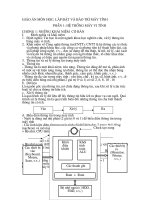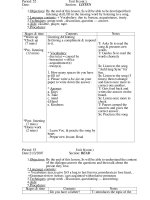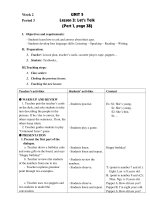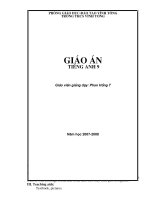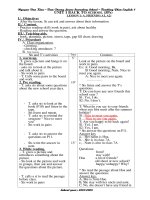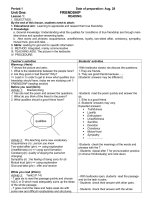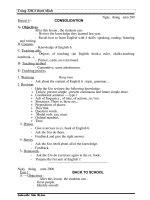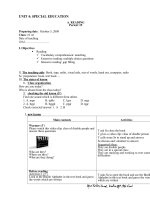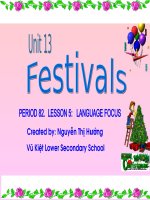giao an ta bai5 va bai6
Bạn đang xem bản rút gọn của tài liệu. Xem và tải ngay bản đầy đủ của tài liệu tại đây (304.39 KB, 23 trang )
PHUOCLONG HIGH SCHOOL
Date: 05/8/2008
Period: 1
Unit 6. FUTURE JOBS
Lesson 1. READING
I. Aims: By the end of the lesson Ss will be able to:
Understand some necessary ways for an interview to find a job.
Understand and know how to use new words through speaking activities, questions and answers,
true or false statements.
II. Teaching aids: textbook
III. Procedures
Teacher’s activities
WARM-UP ( 6’)
- Divide the class into 4 groups, ask Ss in just 2
minutes to write down on a piece of paper a list of jobs
they know. The person who has the most words about
jobs will be the winner.
ANSWER: a waiter, a nurse, a teacher, a doctor, a
farmer, a lawyer, a computer programmer, a reporter, a
tourist guide, a carpenter, a tailor, a worker, an
officer…
- T asks: What job would you like to be in the future?
Why?
- Lead to the new lesson FUTURE JOBS
BEFORE YOU READ ( 4’)
- Ask Ss to work in groups and tick the factors that
they think would help them succeed in a job interview.
Students’s activities
- Group work.
- Answer the question
- Look at the book and do the task.
I think wearing casual clothes would
help me succeed in a job interview.
WHILE YOU READ (20’)
Task 1.
- Have Ss look back to the text and circle the best
- Individual work
meanings A, B or C.
- Have some Ss give the answers, others listen and give
comments.
ANSWER: 1. B 2. C 3. A 4. B
Task 2
- Have Ss to work in pairs and decide whether the
statements are true or false.
- Go around to help Ss.
- Call Ss to give the answers and correct them.
ANSWERS: teacher’s book
AFTER YOU READ (10’)
- Ask Ss to close their books and answer the questions:
- Read the text carefully to do the task.
-Group work
What do we do to prepare for a job interview?
What should we do and shouldn’t we do before, during
and after an interview?
- Go around to give help.
- Give comment
HOMEWORK
Answer the question : Which pieces of advice given in
the passage do you find most useful and least useful?
Why?
IV. Feedback.
Date: 05/8/2008
Period: 1
Unit 6: FUTURE JOBS
Lesson 2. Speaking
I. Aims: By the of the lesson, Ss will be able to:
Make conversations about jobs.
Practise speaking what to do in each job and personal ideas of certain jobs.
II. Teaching aids: Textbook
III. Procedures
Teacher’s activities
WARM-UP ( 10’)
GAME: WHO IS WHO?
- Divide the class into two groups, write down the
names of jobs on pieces of paper. Then the leader of
each group will choose pieces of paper.
Students’s activities
- Each st in group A will give
information of a job and each st in group
B will answer the correct job and vice
versa.
I love children. T teach in BL school. Who am I?
A teacher
I work in a farm. I love animals and plants. Who am I?
A farmer.
- Write on the board the sample:
Teacher is a person who teaches something in a
school.
- Ask another question:
It’s boring/ interesting.
What do you think about teaching?
- Encourage Ss to state their knowledge of what people
often do in each job and give their own idea about that
job.
- Lead to the new leson: Giving opinion about jobs.
BEFORE YOU SPEAK (10’)
Task 1
- Read the following sentences and match a job in A
with the two or more description in B.
- Write down on the board:What is a teacher?/ What
does a teacher do?
- Ask each st to speak basing on the sample written on
the board.
- Go around to check and help Ss’pronunciation and
explain the meaning of new words.
ANSWERS:
- Pair work
- Individual work
A doctor is the one who helps save people’s health.
A farmer is the one who constructs irrigation systems.
WHILE YOU SPEAK (15’)
Task 2
- Discuss which of the jobs in column A you would/
would not like to do. Explain why or why not? You
can
use the cues in column B.
- Write some samples on the board:
+ What would you like to be?
+ I would like to be a/an_________.
+ Why do you like it?
+ Working as a __________ would be fascinating/
interesting/ difficult because I would have a chance to
travel/ to go/ to take care of_____
+ What is interesting / boring about being a_______?
- Have Ss practise the sample through a short
conversation:
+ Nam, do you want to become a teacher?
+ Why?
+ Really?
- Go around to check and help.
- Correct some common mistakes in front of the class.
AFTER YOU SPEAK (10’)
- Work in groups. Talk about a job you may do after
you finish school, using the following cues. (P67)
- Go around to check and help.
- Correct some common mistakes in front of the class.
HOMEWORK
In more than 80 words, write about the job you would
like to work in the near future you have just talked
about.
IV. Feedback.
- Pair work
+ Yes, I do.
+ I like it because it interesting.
+ Yeah. I will have a chance to work
with children.
- Practise in pairs basing on the sample
in the book. (p 66)
- Group work
Date: 04/8/2008
Period: 01
Unit 6. FUTURE JOBS
Lesson 3: LISTENING
I. Aims: By the end of the lesson, Ss will be able to listen to a paragraph mentioning some jobs in the
USA. Through listening tasks Ss can fill in the missing words in the boxes and find true or false
information.
II. Teaching aids: textbook, cassette player
III. Procedures:
Teacher’s activities
WARM-UP ( 7’)
- Ask Ss to fill in the diagram with kinds of suitable jobs
from the box.
- Close the book.
Washing cars, teaching, taking care of sick people,
making cake, producing cars or planes,
engineering, banking, driving cars, selling,
financing, electrical jobs, chemical jobs
Service jobs
Jobs
Manufacturing
jobs
- Answer:
Service jobs: washing cars, teaching, taking care of sick
people, accounting, engineering, banking, driving car,
selling, financing.
Manufacturing jobs: producing cars or planes, mining,
electrical jobs, chemical jobs.
- Explain the two phrases “Service jobs” and
“Manufacturing jobs”.
Manufacturing jobs are jobs in which people make
something or produce things.
Service jobs are jobs in which workers provide service
or do something.
- Lead to the new lesson.
BEFORE YOU LISTEN ( 8’)
- The following jobs are the most popular ones in the
US. Work in pairs and say which jobs is the most
popular in Vietnam.
- Why do you think that the job is the most popular one
in Vietnam now?
Is it a manufacturing job or a service job?
- Ask Ss to listen and repeat some words in the listening
text: workforce, service, category, manufacturing,
economy, goods, retails, wholesales, job market.
- Open the book
- Answer the question.
- Listen and repeat.
WHILE YOU LISTEN (20’)
Task 1.
- Set the situation and explain:
You will hear someone talking about jobs in the USA.
- Listen to the tape. Then complete the boxes.
- Explain the meaning of new words if necessary.
- Ask if Ss have the answer
- Check the answer.
- Pause the cassette at the right answer to make sure Ss
can get the information.
ANSWER:
1. manufacturing 2. service 3. transportation
4. Finance 5. service
Task 2
- Listen again and decide whether the statements are true
- Read all of the sentences in task1 to do
the task.
- Listen to the tape the first time.
- Listen to the tape the second time.
- Listen to the tape the third time.
- Read the instruction to do the task.
or false.
- Check the answer.
- Check the answer.
- Pause the cassette at the right answer to make sure Ss
can get the information.
ANSWER:
1. T 2. T 3. T 4.F 5. F
AFTER YOU LISTEN (10’)
- Work in groups. Summarise the passage basing on
these questions:
1. Is it easy for a high school student to find a job in the
US?
2. Are there any changes in American workforce?
3. How has it changed?
4. What is the difference between manufacturing jobs
and service jobs?
5. How many categories are service jobs grouped into?
What are they?
6. Give the percentage of workers who produced goods
one hundred years ago.
7. Give the percentage of workers who will supply
service in 2020.
- Go around to help Ss.
- Give the answers in front of the class.
- Listen to the tape the first time.
- Listen to the tape the second time.
- Listen to the tape the third time.
- Group work.
HOMEWORK
Write down the summary in the Ss’notebooks.
IV. Feedback.
Date:
Period:
Unit 6
Lesson 3 : WRITING
I. Aims:
Help students understand to write an application for a job.
II. Teaching aids:
Picture , visual aids.
III. Procedure
-
Teacher’s activities
Students’ activities
WARM-UP ( 4’)
Possible answers :
1. It is Dalat city
2. Dalat is famous for its
waterfalls , flowers , friendly
people…
Guide a picture about Dalat
Give some questions and ask sts to discuss
1. Where is it ?
2. What is Dalat famous for?
3. Do you want to work as a tour guide?
4. In order to be a tour guide, what qualifications
do you need?
- Introduce the new lesson
PRE _ WRITING( 10’)
Task 1.
- Ask sts to open their books.
- Ask sts to look at task 1 and explain how to do
- Request the sts to read the advertisement and fill in
the notes
- Ask sts to work in pairs.
- Go around to help them.
- Ask sts to write the answer on the board
1. Type the job : .
2. Level of education needed :
3. Work experience : , .
4. Character and interests :
- Give feedback and correct
3. Yes, I do / No ,I don’t
4. Good English , good
manner , willing to work
hard for a long time , having
a good knowledge about
history and geography …
- Read the ad
- Discuss in pairs
Keys
1. tour guide
2. high school diploma.
3. Experience as a tour guide
fluent English
4. good manner, willing
to work hard for long hours
WHILE WRITING (20’)
Task 2
- Request sts to write a letter to Vinatour, to apply for
the job mentioned in the advertisement in Task 1.
The letter includes the details :
Work in groups
1. Name, address and date of writing
1.Le Nam , 12 Tran Phu Baclieu
6 Aug , 2008
2. Name and address of the company
3. Greeting
4. Introduction : where you saw the ad why you
write the letter
5. Body : your education, work experience , your
characters
6. Conclusion : express your willingness , when
you are available for interview
7. Closing
-
Repeat to sts about form of a letter
Ask sts write letter themselves
Go around to help sts.
2 .Dalat Vinatour
3 .Dear Sir,
4 . I saw your ad in the local newspaper
and would like to post of an experienced
E – speaking local guide to accompany
foreign visitors on trips throughout
Vietnam.
5. I had high school diploma , I have
taken some groups of foreign tourists to
visit places in our city , I speak E
fluently
6. I am work hard and work far from
home , I would be available for work at
any time
Post writing (10’)
_Call the representative of each group to show their
letter
- Ask sts to read their letter
- Call some sts to remark
- Correct some main mistakes
-
Read the letter
Listen then correct
HOMEWORK (2’)
Write homework
Ask sts to rewrite the letter
Ask sts to do exercise ( part Writing unit 6 in Ex book )
IV. Feedback.
Date:
Period:
Unit 6
Lesson 5. LANGUAGE FOCUS
I. Aims:
Practicing weak and strong forms of some conjunctions and prepositions
Reviewing relative clauses.
II. Teaching aids:
Handouts.
III. Procedure
.
Teachers activities
WARM-UP ( 4)
- Give an exercise and ask sts to fill a preposition or a
conjunction from the box
And , but ,at ,for ,from .of ,to
1 . It is small ________ very heavy.
2 . Daisy ___________ her friend are eating ice
cream.
3 .He was looking _________ the children in the park.
4 .He has a painting ____________ Rome
5 . Where are you _____________ ?
Students activities
Do the ex in pairs
Keys :
1 . but
2 . and
3 . at/ for
4 . of
5 . from
Read as a model
Explain weak and strong forms of some conjs and pres
in pronunciation
PRONUNCIATION ( 10)
Task 1
Ask sts to open their books
Explain
Play the tape
Ask sts to repeat
Check
Ask sts to practice reading 10 sentences in E book
Play the tape
Ask sts to repeat
Check
GRAMMAR (30)
Presentation (5)
Give sts handouts
Explain some main points
Practice (15)
Exercise 1:
Ask sts to add who , whoever ,whom , whose , which
to complete the sentences
Check then explain
Go around to help
Repeat the use relative pronouns
1.Who: chổ ngửụứi vaứ laứm chuỷ ngửừ
Vd: The scientist was great once. He was doing
Open the book (Page 70 )
Repeat
Read in chorus
Listen
Read the answers in front of the class
Keys :
1. whom
6. who
2. which
7. whose
3. Whoever
8.who
4. which
9. which
5. which
10. whom
a research on biologist.
The scientist who was doing a research
Look at the board
was great once.
Answer the questions
2.Whom: chỉ người và làm tân ngữ
Vd: The girl is the secretary. You see her at the
desk.
The girl whom you see at the desk is the
Listen then take notes
secretary.
3.Which: chỉ vật có thể làm chủ ngữ hoặc tân ngữ.
Vd: Her hat is yellow. It is on the table.
Her hat which is on the table is yellow.
Vd: Her hat is yellow. I see it on the table.
Her hat which I see on the table is yellow.
4.That : có thể thay thế cho who, whom , which.
Ta có thể thay các đại từ quan hệ trên bằng that
5.Whose: chỉ sở hữu cho người và vật.
Vd: The book is about Denis Thatcher. His wife
became prime master.
The book is about Denis Thatcher whose
wife became prime master.
6.Of which :chỉ sở hữu vật nhưng rất ít sử dụng .
Exercise 2:
Write some sentences on the board
1. Look at the man . He is teaching in the classroom.
2. Look at the man who is teaching in the classroom.
3. Look at the man teaching in the classroom.
Give some questions
The1st sentence. Is it a simple sentence or
complex one ?
The 2nd sentence . Is it a simple sentence or
complex one ?
We use a relative pronoun to combine two simple
sentences into a complex one
They are similar in meanings
We have two ways to write them
Ask sts to join to sentences in two ways exercise 2
Ask sts to read the answers
Correct
Production (10’)
Give sts some exercises
Give handouts
Correct
Do exercise 2 in pairs
Read the answers in front of the class
Correct
Keys :
Teacher book page 70
Do exercises
Correct
HOMEWORK ( 1’)
Do exercises (part Grammar) unit 6 in Ex book
Write homework
IV. Feedback.
Week :
Period :
Date of preparation:
Unit 5. HIGHER EDUCATION
Lesson : Reading
I. Aims
1. Knowledge: Help sts know about advantages and difficulties as well as first impressions when
living and studying at English higher educational instituitions on the first days, compare with that in
Vietnam.
Students know about the application process to a university.
2. Skills:
Main skill: reading (reading for comprehension matching, passage comprehension & arranging
the sequence of an procedure/process).
Sub-skill : speaking.
3. Teaching method: communicative
4.Teaching aids: textbooks, guidebook, computer, handouts
5. Teaching procedure
Stages
&Time
Warmup (7’)
Pre
(5”)
Teacher
-Class organization
-Ask sts” What are you going to do
after finishing high school?”
-Ask sts to give the names of some
universities in Vietnam and in the
world ( by looking on the screen)
-Ask sts “ Which university would
you like to attend? Where will you
live if you choose a university far
from your home town?
- Ask sts to work in groups of 4,
and write down the Adjectives they
guess sts will FEEL when they first
start a new life at a university.
-Have sts give the answers
-Give the comment
Students
- give their own answer.
-look and tell the names of university
-take notes to know how to call the
universities in English.
- work in groups of 4 to write down
the Adjectives they suppose
“ new, happy, sad, exciting, proud,
challenging, scared, independent,
homesick, lonely, …”
T leads to a new lesson
“ IMPRESSIONS OF
UNIVERSITY LIFE”
-pre-teach voc
-work in pairs
-give the answers
- “ You are going to know about
the feelings that three sts named
Sarah, Ellen, and Brenden have in
the first year at university”
Vocabulary
campus, scary, daunting, social
calendar, blame sb for sth;
sth on sb.
While
(23’)
* Task 1 : Ask sts to read the text
silently and do the Task : Using the
right forms of words to complete
the sentences.
- Go round for checking, giving
help and reminding sts of bad
reading habits ( if any)
- Ask sts to give the answers.
- Give feedback
* Task 2 :
- Distribute handouts to sts, and ask
them to put the Adj into the
columns.
amazing, daunting, exciting,
challenging, lonely, scary, free
Sarah
Ellen
- work individually, and then compare
the answer with the neighbor.
- give the answer.
- (other sts ) : comment
- Take notes
Brenden
- handout
-read the passage and do the Task
-Ask sts to read the Passage and do
the Task
-Have sts give the answers
-Give the feedback
- T continues asking sts to find out
the reasons why each st has a very
different feeling.
-do the task in pairs
-give the answer
-take notes
-do the task independently, and then
exchange with partner (pairs)
-give the answer
-take notes
* Task 3
- Handout to sts
Names
Sarah
Ellen
Brenden
Likes
Dislikes
-Ask sts to read the Passage again
and find out what each person likes
and dislikes about their first year at
college.
-Go round for checking anf
offering help.
-Have sts give the answers
-do the task by working in pairs
- compare in groups
-give the answer
- comment
-take notes
-Give the feedback
Post
(10”)
- Ask sts to discuss
1. Is studying at college important?
Why? Is it the only choice/ way to
enter life?
2.How do sts often feel in the first
year studying at a university?
3. What problem will you have
when you start your new life at a
university?
-Have sts present and give their
opinions
-Give the feedback/ correction
( focus on major mistakes)
HOMEWORK
Week:
Period :
Date of preparation:
-Ask sts to learn the words
-Write a para of first feeling in
college life.
-Prepare Part B. SPEAKING
Unit 5. HIGHER EDUCATION
Lesson : Listening
I. Aims
1. Knowledge : Help sts know more about the problems when studying in a new school, especially in
a foreign country.
2. Skills : Main skill : listening (listening for comprehension)
Sub-skill : speaking
3. Teaching method : communicative
4.Teaching aids : textbooks, guidebook, computer ( or cassette player)
5.Teaching procedure
Stages Teacher
& Time
Students
Warmup
-.Class organization
- be called to answer at random.
- Ask sts to mention again ( previous
lesson preview) some problems that
first-year sts have
-Ask sts to list some probems
overseas sts may have.
-Check
-Give the introduction to a new
lesson “ PROBLEMS WHEN
STUDYING ABROAD”
- work in groups
-answer the Q
-take notes
Pre
- Ask sts to listen and repeat the
words ( textbook)
- Guide sts to read and know the
words
- listen and repeat
While
Set the scene : You will listen to a
conversation between John and
Christ Christ tells John about how to
get on with a course to get an MSc at
a school abroad.
-Ask sts to liten and answer “ Where
are the sts? Where are they from?
What are their problems?”
-Play the tape the first time/ or read
aloud
-Check sts’ answer.
- Ask sts to listen again carefully and
do the Task (textbook)
- Have sts give the answers on the
board.
- ask sts to give comment
- Give the correction and feedback.
- Have sts role play ( one asks and
one answers – if there is time)
Post
- listen and answer
-work individually, and then
compare the answer with partner
- give the answer
-comment
-take notes
Key : 1. A ; 2. A; 3. C; 4. A; 5 C
-Ask sts to discuss the Question :
-work in groups
“Would you like to do an
-report
undergraduate course in your country
or abroad?”
- Go round for checking and offering
help
-Have sts report
-Comment
- Have sts pay attention to major
mistakes.
HOMEWORK
-Ask sts to talk about 1) problems sts
may face when studying in a new
school.2) sts’ school days in primary
school
- Prepare Part D. Writing
Week :
Period :
Unit 5. HIGHER EDUCATION
Lesson : Speaking
Date of preparation:
I. Aims
1. Knowledge : Help sts know about the application process to tertiary study in England , and
compare that of Vietnam’s.
2. Skills : Main skill : speaking; Sub-skill : listening & writing
3. Teaching method : communicative
4.Teaching aids : textbooks, guidebook, computer
5.Teaching procedure
Stages Teacher
& Time
Students
Warmup
.Pre
-Class organization
-Ask the sts to talk about the order of the
application process to tertiary study in
the UK
(based on the cards given to them)
Application; Identity card (IC); School
Certificate; School Records; Birth
Certificate; Scores of Entrance
-Give the correction
Pre-teach Vocabulary
Ask sts to do Task 1
Have sts resd their ideas
Give the correction
-Guide sts to do Task 2
-Have sts play roles
-Comment
-Give correction, feedback
While
Post
-Ask sts to discuss the process of
applying to a tertiary institution in
Vietnam
--Comment
-Give correction, feedback
HOMEWORK
-Write the application process again
-Prepare Part C. Listening
Week :
Period :
Date of preparation:
-Work individually
Work in pairs
-Give ideas
-Listen
-Work in pairs
-Work in groups
Task 1
1.an application form
2.an identity card
3.a reference letter
4.a copy of the originals of
school certificate
5. a birth certificate
6.a copy of records of your
performance at school
7.scores of the required entrance
exam
Unit 5. HIGHER EDUCATION
Lesson : Writing
I. Aims
1. Knowledge : Help sts write a letter of request to the UCAS.
2. Skills : Main skill : Writing; Sub-skill : speaking
3. Teaching method : communicative
4.Teaching aids : textbooks, guidebook, overhead projector
5.Teaching procedure
Stages &
Teacher
Students
Time
Pre- (15’)
-Group 1: Ask sts to list/name
some problems when studying
abroad
-Group 2 : Ask sts to name
benefits/ advantages when studying
abroad
-Move around for checking &
helping
-Ask sts to give the answers
-Ask them to compare/comment or
supplement
Studying abroad is interesting. How
can be accepted/ admitted to a
school ?
Today’s lesson is about “ Writing a
letter of Request to be admitted to
a college”
-Reinforce main points of a letter
+ Introduction
+ Request
+ Further information
+ Conclusion
While
(20’)
Post (10’)
-work in groups by discussing
some of the possible problems
-give the answer
-compare & coment
-take notes
-write
-pre_teach voc & structures; and
format of a formal letter
-Ask sts to write a passage
-Have sts pay attention to the form
of writing a passage
-Move around for help
-Ask sts to hand in some of the first
papers
-Show on the srcreen
-Ask sts to comment
Ask sts to give correction &
compare to choose the preferred
paper.
-Coment, correct & give feedback
-look at the screen
HOMEWORK
- Ask sts to write a passage again at
home
-compare & comment
- Prepare Part E. LANGUAGE
FOCUS
-suggest the correction
*Ideas & Voc:
-language
-learning style
-cost of living
-food
-security
-accommodation
------------* may (v)
face: encounter(v)
* I think there are
*Sample writing
……………
Week :
Period :
Unit 5. HIGHER EDUCATION
Lesson :
Date of preparation :
Language Focus
I. Aims : Help sts with the pronunciation of stressed words of more than three-syllables, and
revision of Conditional sentences.
II.Teaching aids : Textbooks, guidebook, tape
III.Teaching method : Communicative
IV.Procedure
Stages&Time
Teacher
Students
Warm-up
-Class organization
Pronunciation
-working in groups
-Introducing stress in 3syllable words.
-clapping hands
-Guiding sts to stress in 3syllable words
-Playing the tape
-Having sts read words
Asking sts to resd sentences
-Asking sts to pay attention
to the stressed words and
giving the correction
-listening
-listening and repeating
-reading words/ sentences
Grammar
-Help sts review of active
and passive sentences
Pesent
-listening & taking notes
-Asking sts to do Ex1
-Moving around for help.
-Having sts give the
answers
-Giving the correction
-working in pairs
-giving the answers
-commenting & comparing
Practice
-Asking sts to do Ex.2
-Moving around for help.
-Having sts give the
answers
-Giving the correction
-working in pairs
-giving the answers
-commenting & comparing
Production
*Asking sts to do Ex.3
-Moving around for help.
-Having sts give the
answers
-Giving the correction
working in groups
-giving the answers
-commenting & comparing
-taking notes
Guidebook
5. HOMEWORK
- Ask sts to do the
excersices again in their
notebooks.
- Prepare Unit 6. FUTIRE
JOBS
